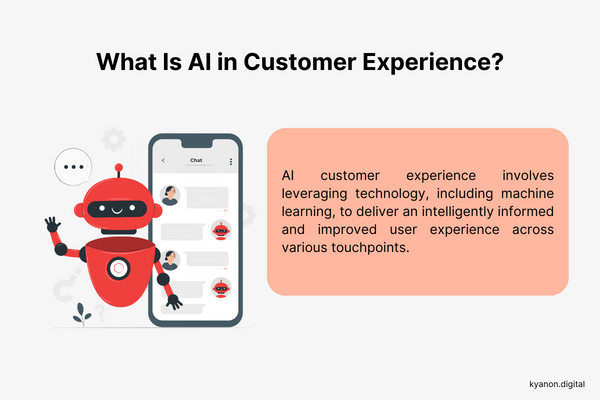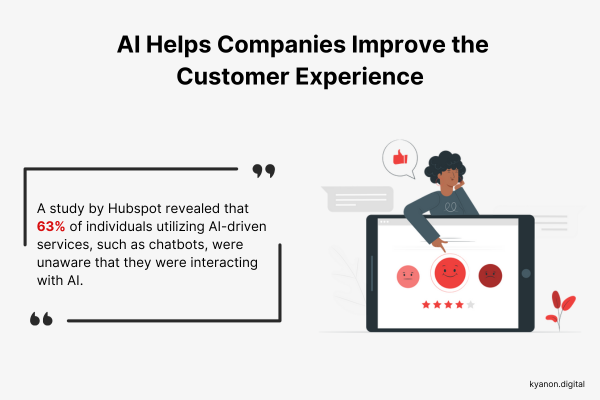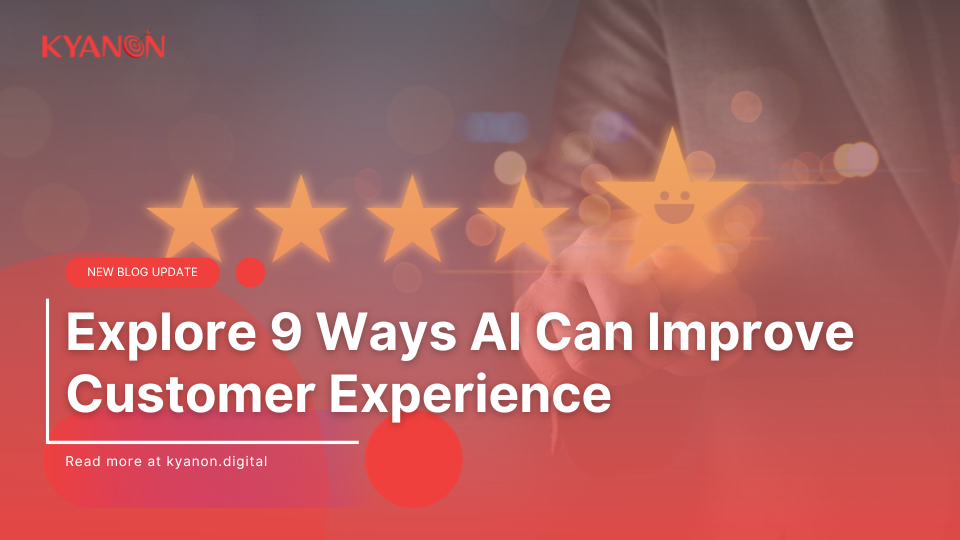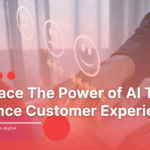According to Accenture, the utilization of Artificial Intelligence (AI) holds the capacity to enhance corporate profitability by an estimated 38% by the year 2035.
Considering this, one might wonder whether enhancements in customer experience driven by AI could be the pivotal factor in boosting your brand’s user engagement, retention, and conversion rates. In the following exploration, we’ll delve into the nature of AI and its influence on customer experience, followed by illustrative examples demonstrating how AI serves as a tool for companies to better connect with their users and elevate engagement levels.
Let’s explore 9 ways AI can improve customer experience in this blog.
1. What Is AI in Customer Experience?
AI customer experience involves leveraging technology, including machine learning, to deliver an intelligently informed and improved user experience across various touchpoints. An established customer experience (CX) insight highlights that 80% of customers express a greater inclination to purchase from brands offering a personalized experience.
AI serves as the technological catalyst, supplying advanced insights to transform this aspiration into a reality for your users.

In our perpetually connected society, characterized by constant connectivity, AI stands out as a game-changer in the realm of customer experience. Forward-thinking brands adopt AI to effortlessly offer users an experience that is not only seamless but also feels relevant and personalized.
2. 9 Ways AI Helps Companies Improve the Customer Experience
While AI and ML are driven by technology, their impact goes beyond mere automation, contributing to a personalized customer experience that can authentically emulate a human touch. A study by Hubspot revealed that 63% of individuals utilizing AI-driven services, such as chatbots, were unaware that they were interacting with AI. Given the continuous enhancements in AI technology, it’s plausible that this percentage is even higher today.

Explore some notable ways in which AI can play a pivotal role in shaping a significant and tailored customer experience for your company.
2.1. AI Helps Predict Customer Behavior and Needs
Predictive personalization, an AI-driven technology, has the ability to create a customer experience that seems tailor-made for each individual. By analyzing factors such as past purchases and behaviors, AI can anticipate the products a customer might find appealing or notify them about the opportune moment for reordering. For instance, streaming services leverage this technology to recommend movies, TV shows, as well as new music and podcasts based on user preferences.
2.2. AI-Powered Insights Improve Decision Making
Not too long ago, crucial business decisions relied heavily on manually collecting data, intuition, and a significant amount of guesswork. Presently, among the forefront Fortune 1000 companies, nearly all have embraced Big Data and AI investments, with a staggering 99% actively participating, and an additional 91.9% indicating an accelerating pace of investment.
In the contemporary landscape, AI and machine learning empower your insights to be more profoundly rooted in data. Utilizing AI, you can analyze user behavior to unveil trends, promptly pinpoint issues, or extract valuable insights that facilitate enhancements to your website or app interface.
2.3. Omnichannel Messaging Capability Boosts Engagement
Chances are, your customers interact with your brand across multiple platforms, spanning your website, app, social media channels, and customer service platform. AI can play a pivotal role in seamlessly connecting all these channels, forging a comprehensive omnichannel customer experience. This is achieved by establishing a unified perception that your brand’s distinct channels—such as social media, email marketing, and support—operate cohesively and consistently as an integrated whole.
2.4. Marketing Becomes More Targeted and Effective
AI has evolved into an exceptionally valuable tool for comprehending and shaping customer behavior. A study from ResearchGate revealed that tailoring messages to individuals with distinct personality types proved more compelling and successful, leading to increased click-through and conversion rates.
When the synergy of Big Data, driven by AI, intersects with behavioral psychology, you gain enhanced capabilities to predict your customers’ responses to your marketing messages. AI assists in identifying and segmenting customers based on their behavior and psychological profiles, providing a deeper understanding of the needs and interests motivating their purchases. This insight allows you to craft targeted messaging that is more likely to persuade and motivate them effectively.
2.5. AI Improves Customer Retention Efforts
As AI progresses rapidly, so does your capacity to retain customers. Machine learning algorithms now play a crucial role in assisting businesses in identifying and proactively addressing issues that might result in customer churn by identifying specific pain points.
With AI, you can precisely identify and prioritize issues based on real data rather than relying on guesswork. Features such as uninstall tracking, for instance, transform the departure of users into valuable insights. These insights not only aid in resolving customer retention challenges but also enable the crafting of effective strategies to win back those customers.
2.6. Pre-Qualifying Leads Boost Conversion
To gain a competitive advantage for your business, ensuring a seamless and stress-free purchasing experience is essential for customers. While popular or essential retail products may sell themselves, introducing a new product with less-established benefits poses a trust-building challenge.
AI chatbots, equipped with pre-programmed questions and answers, prove invaluable in addressing customer queries and concerns. This AI-assisted Q&A process not only aids in resolving inquiries but also enables your company to qualify leads effectively. As the chatbot engages with questions, it ensures that your product aligns well with the customer’s needs before directing them to the sales team. Leveraging AI chat for pre-sales inquiries not only saves valuable time for both customers and the sales team but also enhances the overall efficiency of the sales process.
2.7. Content Becomes Deeply Customized
Is personalization significant? Absolutely! While privacy is a priority, the desire to be more than just a number is equally important. As per a Statista report, 90% of US consumers find the concept of personalization appealing.
AI revolutionizes the customization landscape by enabling in-depth analysis of customer behavior and interests, paving the way for the delivery of personalized content, including:
- Product recommendations
- Relevant written, audio, or video content suggestions
- Targeted marketing emails
Imagine browsing frames on your preferred eyeglasses retailer’s app. It’s not coincidental that you later receive an email suggesting an article about the best frames for your face shape, followed by a notification of a tempting sale on those cat-eye frames that complement your style a week or two later.
2.8. You Get Better at Engaging Your Customers
Envision being able to guide your users through every phase of the customer lifecycle, a capability effortlessly facilitated by AI-powered solutions.
For instance, if you’re a SaaS company welcoming a new customer, after their registration, you could steer them towards a video tutorial or a step-by-step walkthrough to initiate their journey. Subsequently, a well-structured email drip campaign could follow, gradually highlighting key product features every few days, aiding them in maximizing the utility of your product.
As time progresses, personalized insights based on their product usage or targeted offers for premium upgrades might be sent their way. Thanks to AI’s guidance, the personalized touchpoints you incorporate at every stage foster a sense of connection between your customer and your brand.
2.9. Workflows Become More Streamlined
AI has the potential to minimize the necessity for human involvement in resolving customer service issues, resulting in a positive customer experience and more efficient internal operations.
As mentioned earlier, AI aids in pre-qualifying sales leads, but its benefits extend to assisting customers in navigating support queries as well. AI chatbots excel in answering common questions and guiding users to online resources for assistance. This, in turn, reduces the volume of requests handled by the customer service team, allowing them to concentrate on addressing higher-priority customer needs.
Furthermore, AI chatbots can efficiently direct support requests to the appropriate department or offer context about a support inquiry to the agent before customer engagement, thereby streamlining the overall support process.
3. Major Brands Use AI to Improve Customer Experience
Here are some ways Spotify, Starbucks, and Airbnb have used the power of AI to keep customers engaged, make effective product recommendations, and improve in-app search functionality.
3.1. Spotify Discover Weekly
On a weekly basis, Spotify presents Discover Weekly, a personalized playlist crafted by AI. The algorithm behind Spotify analyzes each user’s distinct listening patterns to curate the playlist, introducing them to new music aligned with their preferences. This approach ensures that Spotify not only engages users but also keeps them joyfully immersed in streaming music week after week.

To sweeten the collaborative listening experience for their users, Spotify delivers Spotify Wrapped at the end of each year. Wrapped is a rundown of the user’s most-listened-to songs, genres, podcasts, and more. Every December, Wrapped is a viral sensation on social media as people (including celebrities and influencers) share their stats.
Spotify is also flipping the script on user data, which is normally collected passively then analyzed on the backend. It’s not often that user data is shared with, let alone celebrated by, the customer! AI provides a win-win situation for both Spotify and its user base.
3.2. Starbucks Product Pairings
When customers use Starbucks’ app to place an order, they’re almost certainly unaware of the AI magic working behind the scenes. But it’s no coincidence that when they place an order for their favorite brew, they’re tempted by an image of a sandwich or danish that would pair with it perfectly. That’s the magic of Starbucks’ DeepBrew AI platform at work.

The Starbucks AI platform uses contextual information (such as product availability) from the store where the customer placed their order. It also accounts for factors like local weather and the season itself. It’s no surprise that, love it or hate it, pumpkin spice is an annual autumn sensation.
3.3. Airbnb Listings Search
To a user browsing Airbnb, it may seem as though their search for lodging is based solely on the city or region they searched. It turns out there’s a lot more going on below the surface.
When a user performs a search, Airbnb’s algorithm goes to work finding the best match for them based on more than 100 factors. Those factors include not just location, but also the user’s trip duration and their price preferences. It also considers things like listing views, reviews, and a guest’s previous stays to help surface listings that the user is likely to book.

By embracing AI, companies can not only meet but exceed customer expectations, fostering long-lasting relationships and brand loyalty. The ability of AI to analyze vast datasets, anticipate customer needs, and provide seamless, personalized interactions creates a customer-centric landscape where businesses thrive.
At Kyanon Digital, our Digital Customer Experience service can help your business boost customer engagement and unlock growth with omnichannel experience strategy, digital experience platform adoption, loyalty and engagement with AI and ML integration. Contact us for consultation from experts in the industry.
Source: CleverTap



